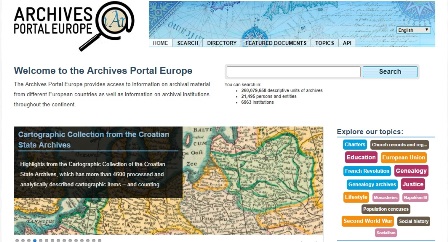For historians, archival research is the most exciting and fun part of the job, but also the most dangerous and potentially stressful. The relation with primary sources is always very complicated; however, when the material cannot be found, or it is scattered around the world in a multitude of institutions, a research project can be abandoned altogether, due to lack of time or travel resources – especially at a time of cuts.

As the name says, Archives Portal Europe is the Portal of European archives: a new digital tool that allows simultaneous search in hundreds (soon to be thousands) archives across Europe.
The project started in 2009 thanks to the collaboration of several national archives. It aims to digitise and harmonise all European archival institutions into a single online catalogue, where researchers from all over the world can search through all European Archives at the same time. The interface is a simple keyword search: much like with Google.
As one can well imagine, it is a monumental objective: Europe holds thousands of thousands of archives, each with their specificities and their own cataloguing systems, their rules on access to the documentation and, of course, their own languages. Dozens of archivists are at work to synchronise such different catalogues and archival traditions. A daunting task; however, also a potential revolution for researchers all over the world.
Apart from the obvious convenience of time and money that simultaneous online research enables, the Portal also allows to investigate new relations amongst primary sources, institutions, and subjects of historical research. By searching in different archives at the same time, it is possible to make new unexplored connections between territories, (inter)national and local archives, historical subjects and related collections. It is possible to find sources where you had never thought of looking: for example, did you know that The Women’s Library in London holds a conspicuous collectionon Giuseppe Garibaldi? Or that Charles de Gaulle in person greeted the Dutch judo champion Anton Geesink with a vase?
Also, it is possible to make new comparisons previously impossible, if only for the territorial distance between documents. For example, the simultaneous search amongst hundreds of parish records from all over Europe could lead to new interpretations of Europe’s local histories.
One fundamental feature of Archives Portal Europe is the multilingual search. In eight years of work, the Portal has grown to be the largest online catalogue in the world, with 253 million descriptive units accessible online – and the number increases daily. At the present, the Portal hosts the catalogues of hundreds of institutions from more than 30 countries, written in 20 different languages, from English to Georgian to Lithuanian. In order to navigate this Babel of languages, Archives Portal Europe created a series of tools that allow to search the same subject in different languages at the same time, and to use keywords in different languages in the same search.
Archives Portal Europe is a completely free and open tool, both for the researchers using it, and for the archives that want to make their holdings available online. While hundreds of institutions have both their catalogues and documents already online, thousands more are working with the Portal’s technical team to upload their sources. Not all records described in the Portal are available online yet, as each institution supervise its digitisation processes separately. However, Archives Portal Europe provides an accurate description of all collections, and the means to contact each archive directly –the Portal aims to build a digital community of archivists and researchers who work on European historical sources.
In 2015, the Archives Portal Europe Foundation (APEF) was established to guarantee continuity and a better coordination of the project; it is entirely supported by the national archives that coordinate the project on a local level. APEF has the objective to ensure the digital future not only of European archives, but of any archive holding record on European history, so potentially all archival institutions in the world. Furthermore, the Foundation aims to make archival research more and more integrated and easy to access.
Archives Portal Europe is a permanent work in progress, to create a new type of archival research free of geographical and linguistic barriers.
Follow us
www.archivesportaleurope.net
www.archivesportaleuropefoundation.eu
Facebook: www.facebook.com/archivesportaleurope.net/?fref=ts
Twitter: @ArchivesPortal
Instagram: www.instagram.com/archivesportaleurope
A video tutorial on multilingual search is available online www.youtube.com/watch?v=wsRb2rwCngo
A new way of doing archival research www.youtube.com/watch?v=m-fpu4eVSQ8&t=22s



